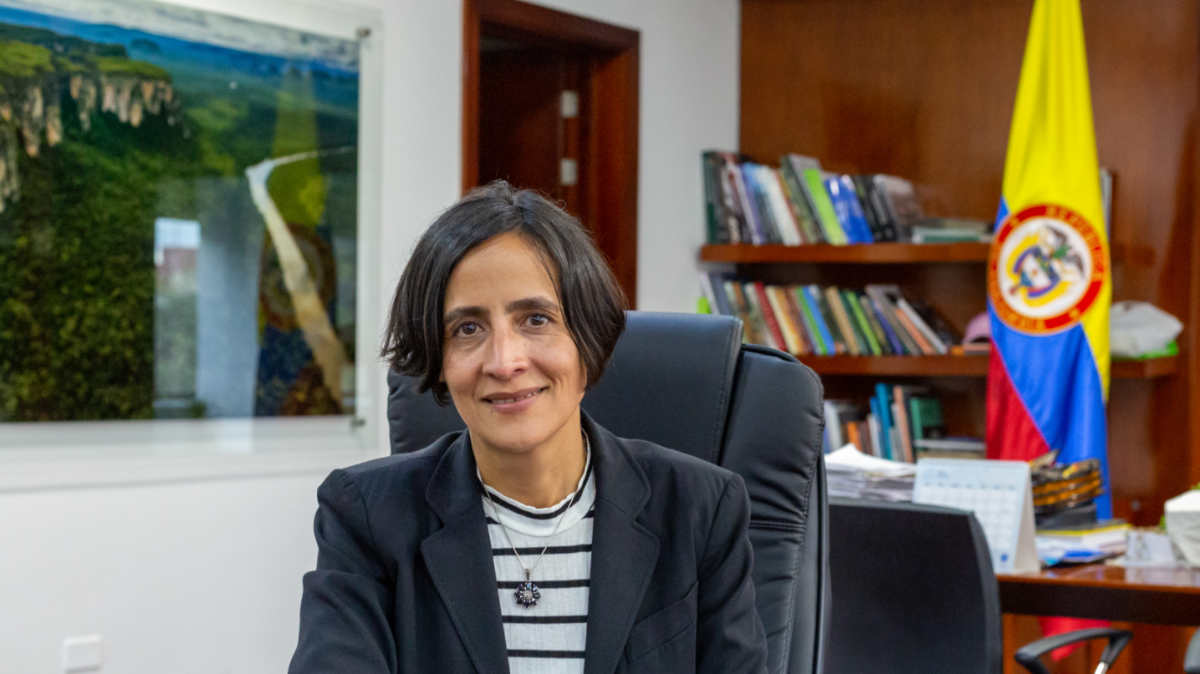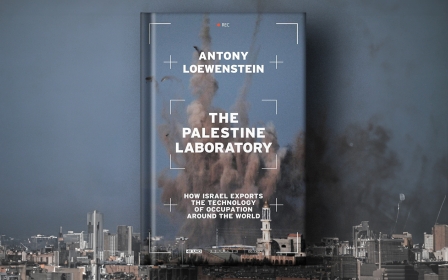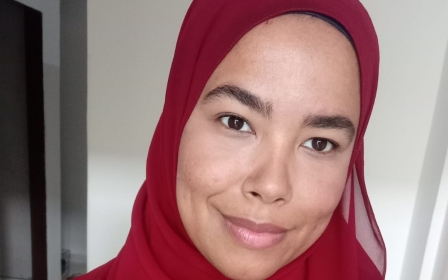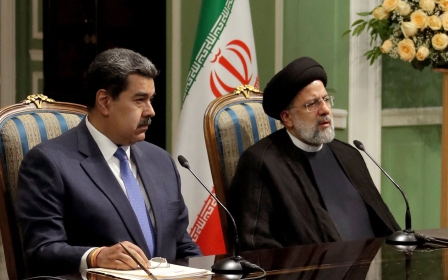How Colombia’s first Palestinian minister weaves her heritage into politics
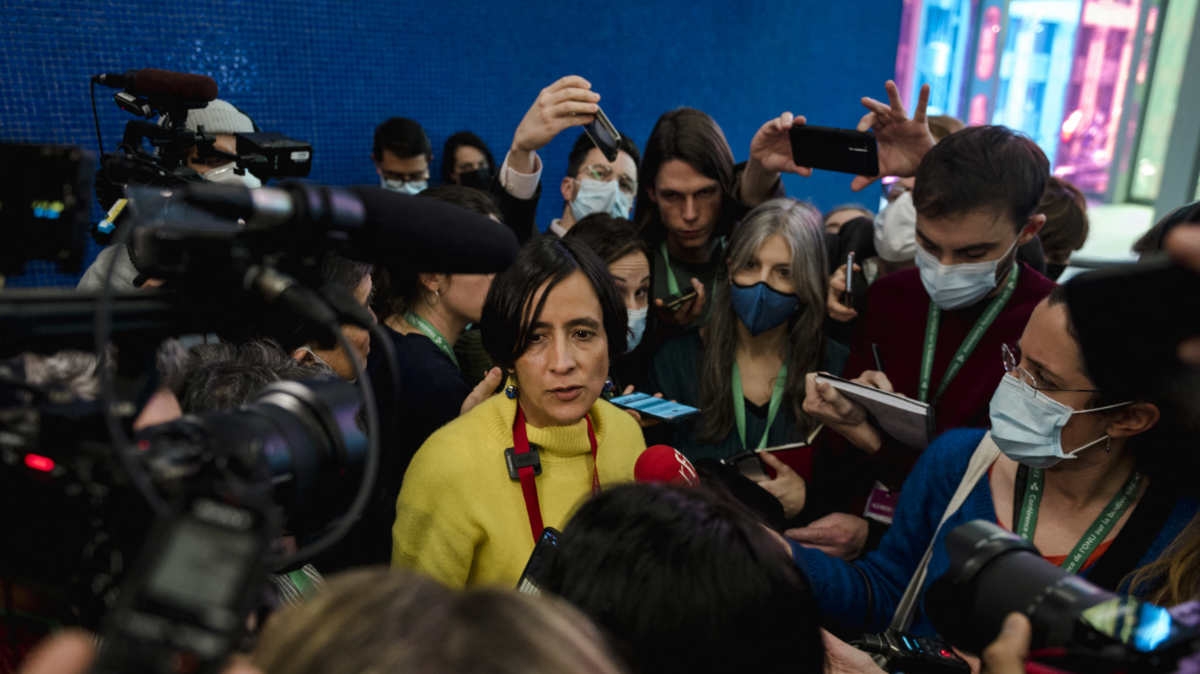
Since she was a little girl growing up in the Colombian capital of Bogota, Susana Muhamad knew she was not like other children around her. Her surname was a constant reminder of an inherited difference, something “weird”.
Her full name is Maria Susana Muhamad Gonzalez, but her Arab surname is a rarity - one she couldn’t quite wrap her head around as a child.
“You have a surname that you don’t quite understand where it comes from or what its roots are, and it feels like something is missing. There was always a question,” Muhamad tells Middle East Eye.
“Since I was five years old, I’ve had to spell out my name for people, I thought: ‘This isn’t from here, it’s weird’.”
Her name was passed onto her from her grandfather, a Palestinian Muslim who arrived in Colombia in 1925, as a wave of mass migration from the crumbling Ottoman Empire reached Latin American shores.
New MEE newsletter: Jerusalem Dispatch
Sign up to get the latest insights and analysis on Israel-Palestine, alongside Turkey Unpacked and other MEE newsletters
Muhamad recalls that her grandfather used to “talk funny” and consciously set aside his Palestinian origin to more easily integrate to his adopted country.
Her grandfather refrained from speaking Arabic to his children and did not pass down any religious traditions, keeping his Quran on his nightstand, in the hopes of facilitating his family's integration.
“What they (Palestinian migrants) did was completely cut off their religious and cultural connections in order to assimilate and survive."
Her grandfather passed away when Muhamad was just six years old, but he still helped shape the politics and personality of the Colombian politician and internationally recognised environmentalist.
Personal Palestinian pilgrimage
What once felt weird or out of place has instead become a source of pride for Muhamad. She is currently Colombia’s environment minister, and the country’s first-ever minister of Palestinian origin, a fact she confesses has been “significant” to her personally.
To better understand her family’s origins, she travelled to Palestine in 2009 to visit her grandfather’s hometown and “answer the questions” that she had about her family’s past and the weight of her name.
“I just wanted to go and visit the place and get a better understanding, but when I arrived I found a whole family there. That was very surprising because it’s intense,” she says, tears welling in her eyes and her voice cracking as she recalls her trip.
“Meeting that family was like completing myself,” she says. “Witnessing that family bond of so many decades, [having] that question and going to answer it was very significant for me. It answered a lot of personal questions.”
Muhamad wears her Palestinian heritage on her sleeve, and she’s woven her family’s origins into her politics and personal growth. The pilgrimage to her family’s ancestral homeland and meeting her distant relatives struck a chord with the minister, and the personal weight the trip holds is evident even 14 years later.
“I realised it wasn’t just a surname, it’s a product of a historic process. I’m involved in that historic process and it has a meaning, so I always have something that reminds me of those origins,” she tells MEE.
She still wears a necklace a distant relative gifted her on her trip to Palestine, and occasionally holds it during the interview while recalling the visit and its impact. A box adorned with Arab calligraphy and full of local Arab sweets also adorns the table in her office.
Political influence
Muhamad is now a prominent figure in the cabinet of Colombian President Gustavo Petro, the first leftist leader in the country’s history and an open defender of the Palestinian cause.
As minister, she has been tasked with spearheading an ambitious environmental agenda and is working on the government's energetic transition to steer Colombia towards renewable and sustainable energy.
Prior to being appointed minister, she also served as secretary of the environment as well as secretary general of the Bogota town hall, while Petro was serving as the capital’s mayor between 2013 and 2016. In 2015, while Muhamad served the town hall, the Palestinian flag was raised in Bogota’s central Bolívar Square to mirror the United Nations’ gesture.
The minister was also recently included in Reuters' list of 25 most influential women leading the fight against climate change.
“I sometimes wonder if my grandfather would have imagined me to be in the position I am in today,” she says, holding back tears.
Muhamad confesses that her Palestinian background has helped shape her politically and considers herself an active defender of the Palestinian cause.
However, she recognises that her position as a cabinet minister has restrained the level of advocacy she can make in favour of Palestine. “I am a defender of the Palestinian cause, but now as a public servant in the Colombian government, it is complex.
“I try to internally push this government – I cannot do so externally – to have a strong position in its international relations regarding the demands of the Palestinian nation and hopefully speak out against Israel's abuses,” she explains.
'I am a defender of the Palestinian cause'
- Susana Muhamad, Colombia's environment minister
In April, she responded to a tweet by President Petro by saying “there is a lot we need to do for Palestine, starting by renegotiating [Colombia’s] free trade agreement with Israel”.
Last May, she celebrated the Bogota city council’s decision to rename a street in the capital the State of Palestine Street.
During Petro’s presidential inauguration last August, Muhamad also shared a photo of her alongside Palestine's foreign minister, Riyad al-Maliki, who had attended the ceremony in Bogota.
The caption accompanying the photo reads: “I always carry in my spirit the Palestinian roots from which I come, it was an honour to greet the foreign minister of Palestine and to talk about the future of our peoples.”
Her surname is no longer a source of confusion yet more so a reminder of a family bond and a collective cause that has come to shape Muhamad.
Despite sitting in her office flanked by the Colombian flag, her heritage is clear, as is her personal and political connection to the Palestinian cause and the country her grandfather left behind almost a century ago.
This article is available in French on Middle East Eye French edition.
Middle East Eye delivers independent and unrivalled coverage and analysis of the Middle East, North Africa and beyond. To learn more about republishing this content and the associated fees, please fill out this form. More about MEE can be found here.


